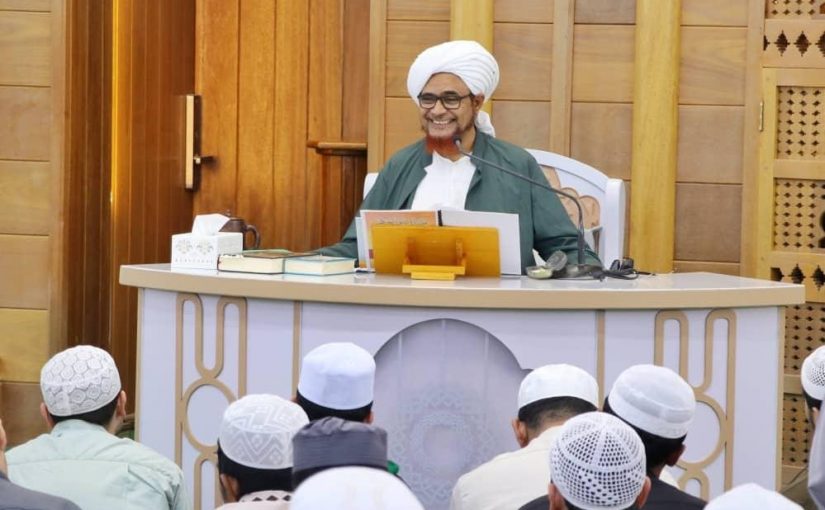A Summary of Lesson Two of Sayyidi Habib Umar bin Hafiz’s commentary on “Miftah al-Sarair” (“Key to the Inner Secrets”) by his ancestor, Shaykh Abu Bakr bin Salim. The book contains essential advice for every seeker. Continue reading Key to the Inner Secrets – Lesson Two – Obedience and Intention
Category: Classes
Key to the Inner Secrets – Lesson One – Lifting the Veil
A Summary of Lesson One of Sayyidi Habib Umar bin Hafiz’s commentary on “Miftah al-Sara’ir” (“Key to the Inner Secrets”) by his ancestor, Shaykh Abu Bakr bin Salim. The book contains essential advice for every seeker. Continue reading Key to the Inner Secrets – Lesson One – Lifting the Veil
Insights into Purification: Muhammad ﷺ , the Purest of all People
Things which are considered impurities in the case of most people are considered pure in the case of the Prophet ﷺ and the other Prophets. There are many hadith that point to this fact.
Abdullah bin Zubayr drank the Prophet’s blood after cupping him. Other Companions sucked the blood from his wounds. Continue reading Insights into Purification: Muhammad ﷺ , the Purest of all People
Insights into Purification: Removing Impurities (Part Two)
It is possible to purify something which has been contaminated with filth but it is impossible to purify something which is itself filth. It is impossible to purify excrement, even if you washed it twenty times. The filth would in fact increase.
Likewise, through an intention, an act that is merely permissible can become something that is recommended or it can become something that is forbidden. Eating is praiseworthy if it is done with the intention to gain strength to worship Allah. However, an intention has no effect on an act that is forbidden. Stealing someone’s money with the intention of giving it to the poor does not make stealing permissible. Continue reading Insights into Purification: Removing Impurities (Part Two)
Insights into Purification: Removing Impurities (Part One)
Allah says: Truly Allah loves those who constantly repent and those who constantly seek to purify themselves [2:222].
Allah said to the purest of people ﷺ: Cleanse your garments [74:4].
Allah says: Only the purified ones may touch it [56:79]. Habib Ahmad bin Hasan al-‘Attas said that this principle applies to all things. Whoever wishes to obtain knowledge or certitude or proximity to Allah, say to him: Only the purified ones may touch it. Only when a person has purified himself is he ready to receive divine gifts. Likewise only when he has removed outward impurity is he ready to enter into Allah’s presence by performing the prayer. Continue reading Insights into Purification: Removing Impurities (Part One)
Insights into Purification: On Loss of Intellect and Sleep
If someone loses their intellect, their wudu is nullified.
The word for intellect (‘aql) has the meaning of preventing. A person’s intellect prevents him from committing a reprehensible act.
It has been narrated that if someone commits a sin, part of his intellect departs and never returns. The meaning of this is that committing a sin dims the light of a person’s faith and intellect. If he repents and performs a good deed, it will wipe out the effect of the sin but it will not make up for the loss of intellect. Had he not committed the sin in the first place, the light of his faith and intellect would have increased. Continue reading Insights into Purification: On Loss of Intellect and Sleep
Insights into Purification: When is it recommended to perform Wudu?
There are many times and situations in which it is recommended to perform wudu. Here are some of them:
1. When you wish to read or carry the books of tafsir and hadith, out of veneration for the speech of Allah and His Messenger ﷺ . Allah says: If someone venerates the things Allah has made sacred, this is truly a sign of piety in the heart (22:32). When Imam Malik was asked to narrate hadith, he would perform ghusl, put on perfume and put on his best clothes before doing so. This shows you the secret of adab (correct etiquette) which is a means of elevation. When Muslims neglected these etiquettes they lost out on great good. They lost the spirit of their acts of worship while the outward form remained. One of the knowers of Allah said: “The religion is veneration for the religion.” The degree to which you benefit from any act of worship is according to the degree of your veneration for that act of worship. Continue reading Insights into Purification: When is it recommended to perform Wudu?
Insights into Purification: Maintaining and Renewing Your Wudu
Wudu is the weapon of the believer and is a means of protection. It is recommended to be constantly in a state of wudu, and this is one of the etiquettes of the seeker on the path to Allah. If harm comes to you when you are not in a state of wudu, then only blame yourself. Continue reading Insights into Purification: Maintaining and Renewing Your Wudu
Insights into Purification: Seeking Barakah from the Prophet’s Wudu Water
Sayyiduna Bilal would bring the Prophet ﷺ water for him to perform wudu. He would pour the water for him and collect the water that ran off his blessed body in a container. Then he would go and distribute this water to the Companions, who would almost fight to get some. Some would drink from it and others would pour it on their faces and chests. Those who did not receive any water would take some of the moisture from those who had received water. Continue reading Insights into Purification: Seeking Barakah from the Prophet’s Wudu Water
Tafsir of Short Surahs: Surat al-Duha
A summary of Habib Umar’s commentary on Surat al-Duha, Ramadan 1436
This surah was revealed after a period in which revelation had stopped coming to the Prophet ﷺ . Some of the disbelievers of Quraysh, including the wife of Abu Lahab, said to the Prophet mockingly that Allah had forsaken him and was displeased with him.
Allah then revealed:
By the midmorning
And by the night when it is still
Your Lord has neither forsaken you, nor is He displeased.









